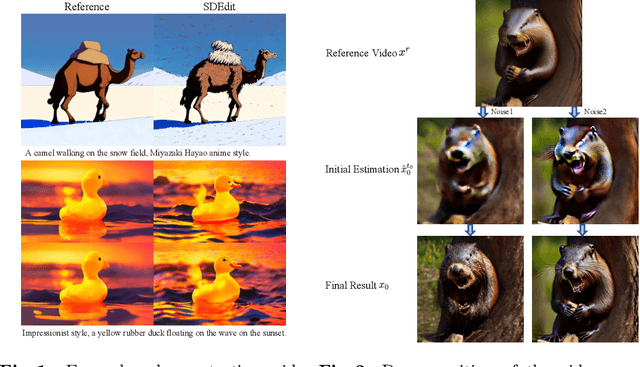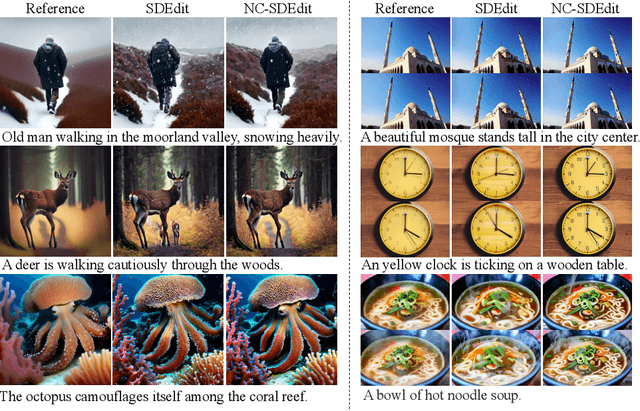Qinyu Yang
Noise Calibration: Plug-and-play Content-Preserving Video Enhancement using Pre-trained Video Diffusion Models
Jul 14, 2024



Abstract:In order to improve the quality of synthesized videos, currently, one predominant method involves retraining an expert diffusion model and then implementing a noising-denoising process for refinement. Despite the significant training costs, maintaining consistency of content between the original and enhanced videos remains a major challenge. To tackle this challenge, we propose a novel formulation that considers both visual quality and consistency of content. Consistency of content is ensured by a proposed loss function that maintains the structure of the input, while visual quality is improved by utilizing the denoising process of pretrained diffusion models. To address the formulated optimization problem, we have developed a plug-and-play noise optimization strategy, referred to as Noise Calibration. By refining the initial random noise through a few iterations, the content of original video can be largely preserved, and the enhancement effect demonstrates a notable improvement. Extensive experiments have demonstrated the effectiveness of the proposed method.
Learning A Coarse-to-Fine Diffusion Transformer for Image Restoration
Aug 29, 2023Abstract:Recent years have witnessed the remarkable performance of diffusion models in various vision tasks. However, for image restoration that aims to recover clear images with sharper details from given degraded observations, diffusion-based methods may fail to recover promising results due to inaccurate noise estimation. Moreover, simple constraining noises cannot effectively learn complex degradation information, which subsequently hinders the model capacity. To solve the above problems, we propose a coarse-to-fine diffusion Transformer (C2F-DFT) for image restoration. Specifically, our C2F-DFT contains diffusion self-attention (DFSA) and diffusion feed-forward network (DFN) within a new coarse-to-fine training scheme. The DFSA and DFN respectively capture the long-range diffusion dependencies and learn hierarchy diffusion representation to facilitate better restoration. In the coarse training stage, our C2F-DFT estimates noises and then generates the final clean image by a sampling algorithm. To further improve the restoration quality, we propose a simple yet effective fine training scheme. It first exploits the coarse-trained diffusion model with fixed steps to generate restoration results, which then would be constrained with corresponding ground-truth ones to optimize the models to remedy the unsatisfactory results affected by inaccurate noise estimation. Extensive experiments show that C2F-DFT significantly outperforms diffusion-based restoration method IR-SDE and achieves competitive performance compared with Transformer-based state-of-the-art methods on $3$ tasks, including deraining, deblurring, and real denoising. The code is available at https://github.com/wlydlut/C2F-DFT.
 Add to Chrome
Add to Chrome Add to Firefox
Add to Firefox Add to Edge
Add to Edge